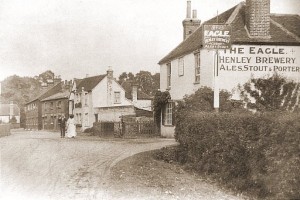23rd December 1914
The weather continued to be cold. Dawn brought a white frost and fog which gave way to snow showers later in the day.
Any silence that usually accompanies such a crisp winter’s morning was shattered when British shells landed dangerously close to the Dorset trenches. The rest of the day was quiet, although the 5th Division’s diary notes that the Dorsets inflicted casualties on a German patrol. There’s no mention of that engagement in the Dorsets’ diary, although the diary’s entries have become rather succinct of late.
Yesterday’s letter from Frank was a long one. So let’s start with family and friends. It’s the time for all that you know. Now then, don’t be like that. It’s only once a year.
Frank is very, very grateful for his Christmas parcels sent by Mabel and Aunt Carrie and Uncle Matt. But he only describes one present: a pair of vest and pants, which would have been very welcome I’m sure. What ever else he received presently remains a mystery.
There’s a new character introduced in yesterday’s letter: “E. Jim”. It’s going to be impossible to trace his origins with such a cryptic and common name, but it looks like his luck has run out with his current girlfriend. No so lucky Jim. Frank’s girlfriend, Jess, has written again but I’m no closer to discovering her identity, much like E Jim and Tom.
Frank still hasn’t received the chocolate from my Great Grandfather. Perhaps I can trace my inability to reply to letters back to Carl Robert Debnam. If my Grandfather Bob was a chip off the old block then he’d have already eaten the chocolate. Especially if they were Ferrero Rocher. Frank clamours for Kitchener’s Army to come out to France. It was to be a while before any of Kitchener’s Army made it to Belgium. Tom has gone back to his ship, somewhat reluctantly.
Frank has written to Uncle (Matt?) about his experiences. “Well Till that was exactly what happened in that letter I wrote to Uncle, only it was very hard and we had to rough it, but we are still alive and kicking, so we can’t grumble.” It appears that Frank has been sparing Mabel any horror stories but she’s found out anyway and asked him about it in one of her letters. I wonder whether Frank’s referring to a specific action. It’s probably the retreat from Mons.
Franks’ ex, Dolly, continues to enquire after him and he promises Mabel to visit her when he returns. “I should certainly find the time to go and see her”.
Frank then refers to the trams in London which ad delayed Mabel’s journey across London. What happened to the trams? I luckily found this story in the Telegraph’s archives on the 12th December 1914. At just after 5pm on the 11th December there was an explosion at Greenwich generating station which, unbelievably, powered the entire London tram network. London’s commuters endured a sodden journey home. Some women apparently shared a taxi – fancy that! For once the Germans aren’t blamed. Further explosions are alluded to with:
So the Germans have been giving England a few shells, that’s just what they send over to us and the Bhoys shout out when we hear them whizzing in the air, look out Bhoys. J Johnson and we all duck and chance what happens.
This refers to Germany’s daring raid on the 16th December when three of their battlecruisers shelled Scarborough, Hartlepool and Whitby on the east coast of England. Despite the Royal Navy’s prior knowledge of this raid (they had already broken German signals), a series of misplaced confidence and incompetence allowed the Germans to fire several thousand shells (many failed to detonate) and slip away without any significant losses. The three towns suffered extensive damage and 137 fatalities and 592 casualties. The attacks sparked outrage around the globe, especially America. Frank’s incredibly blasé about the raid’s success. He blames the fog. The British Press weren’t convinced and neither am I.
Frank ends the letter with his unfailing kindness by giving some of his pay to his sister. 6d is a third of what he earns so it’s an incredibly generous gesture. I also can’t help but think that Frank is a man who knows he has nothing left to lose.
